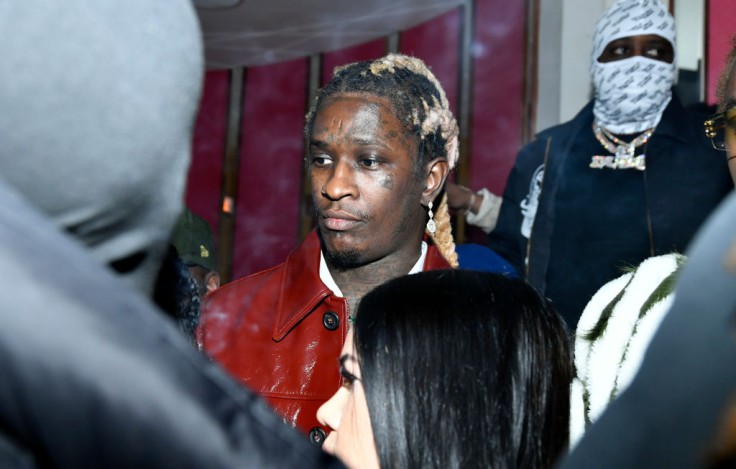
In a 56-count gang indictment, the Grammy-winning rapper Young Thug's lyrics are mentioned as evidence, reigniting the controversy over whether lyrics are protected free expression.
According to the 88-page indictment acquired by CNN, lyrics from popular songs by the rapper, including "Slime Sh*t," "Original Slime Sh*t," and "Anyone," were presented as examples of "overt activities," some of which constitute racketeering.
Young Thug, whose actual name is Jeffery Williams, allegedly created the group Young Slime Life in late 2012 and was a significant figure in many YSL activities, according to the prosecution. Gunna, whose actual name is Sergio Giovanni Kitchens, is charged in the document as well. Monday, Williams was arrested at his Atlanta residence, according to authorities.
Prosecutors alleged that Williams hired an Infiniti Q50 vehicle from Hertz in 2015, which was then used in the murder of a rival gang member. There are also references that portray Williams as the leader of the YSL gang, as two colleagues discussed how to acquire his authorization to try the murder of rapper YFN Lucci while he was in prison.
The indictment references dozens of lyrical statements, including "I'm prepared to take them down," "murder gang sh*t," and "I never killed anybody but I got something to do with that body."
In the indictment, references to Young Slime Life may also be seen in the lyrics of other popular rappers and in social media posts.
Williams is charged with conspiracy to violate the Racketeer Influenced and Corrupt Organizations Act (RICO) and participation in criminal street gang activity. He has been put into the Fulton County jail.
ALSO READ: Kendrick Lamar Drops MASSIVE Surprise on New Album Cover [Check It Out]
This is hardly the first time criminal prosecutors have utilized music lyrics. In 2019, authorities questioned Brooklyn rapper Tekashi 6ix9ine on the lyrical content of his song "GUMMO," inquiring if it contained threats against rivals. In 2017, prosecutors attempted to use "Flex Freestyle" by Drakeo the Ruler as evidence that he plotted to murder another rapper.
Not everyone favors the use of songs as evidence by prosecutors. Rapper Killer Mike argues in the book "Rap on Trial: Race, Lyrics, and Guilt in America" by Erik Nielson and Andrea L. Dennis that rap as an art form is a safe arena in which genuine emotions may and should be expressed.
It has the potential to silence a generation of artists exercising their First Amendment right to free speech, he said. Our criminal justice system has consistently sought ways to punish these individuals, despite the fact that we ought to be supporting their voices.
Killer Mike also remarked that artists from genres other than rap are frequently praised for their gloomy lyrics, yet rappers are reviled.
Last year, New York state senators sponsored the "Rap Music on Trial" bill, which would prohibit the use of art, including song lyrics, as evidence in criminal proceedings. Jay-Z, Meek Mill, Big Sean, and Kelly Rowland, as well as other musicians, endorsed the bill.
However, Fulton County District Attorney Fani Willis disagrees.
"I believe in the First Amendment; it's one of our most precious rights. However the First Amendment does not protect people from prosecutors using (lyrics) as evidence if it is such," Willis said during a press conference Tuesday. "In this case, we put it as overt and predicate acts within the RICO count because we believe that's exactly what it is."
© 2026 MusicTimes.com All rights reserved. Do not reproduce without permission.







